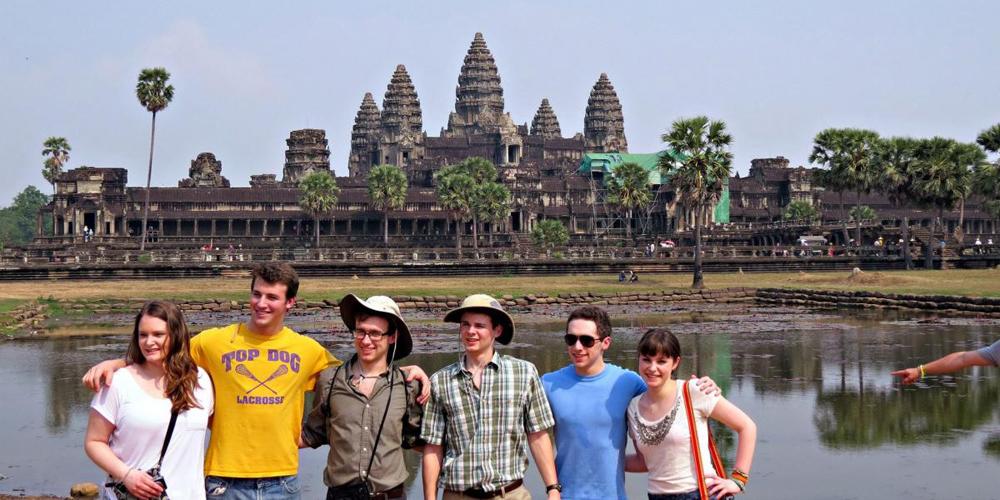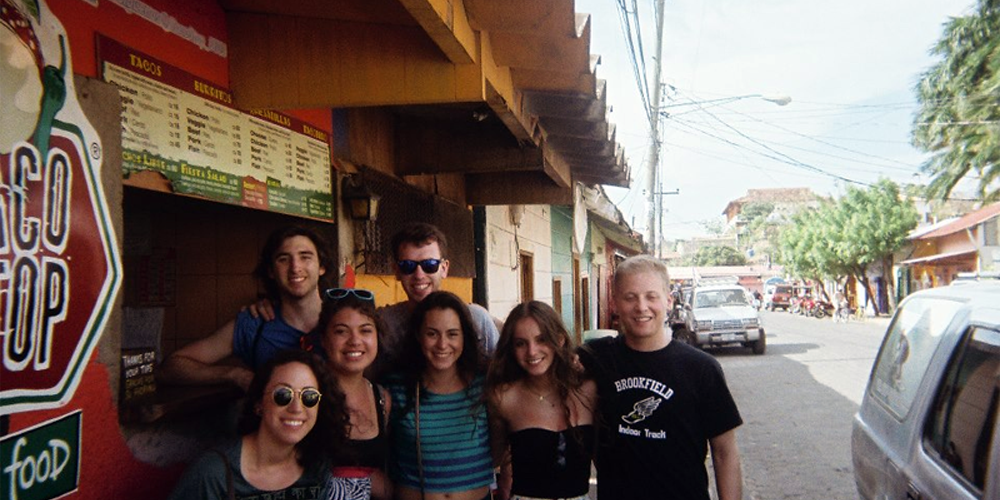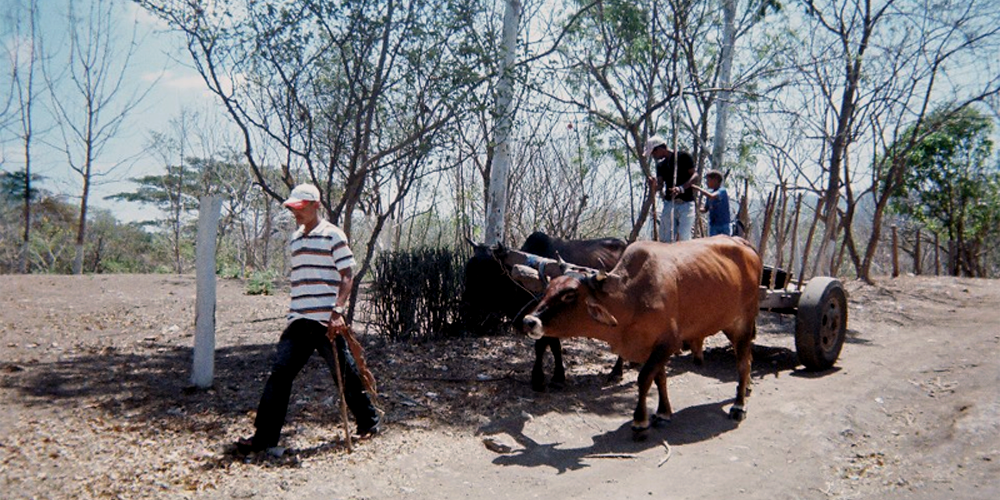 Cambodia The Sustainable Development and CSB teams posing in front of the Reflection Pool at Angkor Wat
Cambodia The Sustainable Development and CSB teams posing in front of the Reflection Pool at Angkor Wat Nicaragua Charlie Baldwin, Connor Luther, Eleni O'flarity, Kevin Hoogenboom, Amberlyn Alualu, Emma Fried, and Melanie Grinnel at our favorite taco stand!
Nicaragua Charlie Baldwin, Connor Luther, Eleni O'flarity, Kevin Hoogenboom, Amberlyn Alualu, Emma Fried, and Melanie Grinnel at our favorite taco stand! Pennsylvania Fracking Fracking Well Pad
Pennsylvania Fracking Fracking Well Pad Nicaragua The people in the rural village do not own cars so they must use other means of transportation and find alternative yet efficient ways of carrying heavy items along the dirt road and in the hot sun.
Nicaragua The people in the rural village do not own cars so they must use other means of transportation and find alternative yet efficient ways of carrying heavy items along the dirt road and in the hot sun.
Cambodia
Partner: NGO Caring for Cambodia
We partnered with the NGO Caring for Cambodia (https://caringforcambodia.org/). CFC was started in 2003 by Jamie Amelio and her husband, Bill Amelio, ’79, with the goal of providing education for Cambodian youth by strengthening schools in the Siem Reap area. So far, CFC has enhanced operations for 8 schools and has educated over 8,500 students. Their first completely CFC-educated graduating class will be graduating this June. The lack of infrastructure in Cambodia is a result of previous decades of turmoil and political upheaval as the Khmer Rouge destroyed the existing professional class and left society with few role models for the next generation. CFC aims to empower the youth of Cambodia to seize the opportunity for an education and a better future.
Merely educating the youth of Siem Reap is just the tip of the iceberg for CFC’s challenge. The students often struggle to focus in class because they are distracted by hunger, and many of them have to travel very far to even get to the schools. There is also the challenge of keeping the students enrolled in school, as there is a need for them to help provide for their families by doing farm work or by selling items in the informal economy. Motivating the students to stay in school and to set them up for a brighter future is the biggest challenge that Caring for Cambodia faces.
They have attempted to combat the issue of hunger by instituting a program called Food for Thought which provides a porridge-like meal for breakfast and lunch so that the students are more motivated to come to school and also more focused because they are not hungry. This porridge contains grain, vegetables, and protein to provide the necessary nutrients that the students may not be receiving otherwise. They have noted a marked difference in the attentiveness and participation of the students but have not yet found a way to track this progress in order to garner more financial support.
As far as awards go, CFC has received the Golden Hand Award from the Cambodian government to a non-Cambodian for many of its members including but not limited to Natalie Bastow, Jamie Amelio, and Kaye Bach. This award is given for outstanding service to the Cambodian community. The other award that CFC has received is the Traditional Home Magazine: Classic Women of the Year Award. This award goes to six women who have made their communities a better place through volunteer work. This award went to Jamie Amelio in 2010.
Caring for Cambodia, despite its perceived successes, does not really have a manner in which to track the students’ performance, growth, health or future in a systematic way. They have attempted to do this with paper records, however those are often lost, duplicated incorrectly, or non-existent at this point. They face a great deal of difficulty trying to figure out which students are progressing and which ones are not. In order to better suit the needs of the community and of the students themselves, CFC needs a system that they can comparatively analyze students, faculty and their methods as a whole. Right now they are essentially going off of holistic results and are not really capable of statistically analyzing their student population. It is their belief that a student management system capable of doing such work will greatly benefit them in terms of their effectiveness and potential for financial support. They have asked the Lehigh team to construct a school management system that will fit these needs and can be sustained for years to come.
Currently, our Sustainable Development team is collaborating with a group of Computer Science and Business (CSB) students to discuss and create a database that can meet the needs of CFC. Our task also includes searching for cloud software that would come to little or no cost for the NGO and to also apply for a grant from Microsoft to obtain more funding for the project. Our role in supporting the CSB team’s project is to make sure that what they are doing is sustainable: the database must be adaptable so that information can be added or removed, it must be easily accessible and easy to use so that the faculty on the ground can operate it, and it needs to come at the lowest cost possible to create and maintain. One of the challenges of making such a large database in an area like Cambodia is the limited connectivity when users from around the world will be accessing the database.
The Team

The Sustainable Development and CSB teams posing in front of the Reflection Pool at Angkor Wat
Our team is comprised of two faculty leaders, three Computer Science and Business students, and the Sustainable Development group of interdisciplinary students. The CSB team consists of three juniors—Michael Toth, Ryan White, and Ashley Ryan—and two Computer Science professors—Professor of Practice Sharon Kalafut and Adjunct Professor Ronald Crane. The CSB team combines a very intense programming-oriented mindset with their strong business background to form an incredible team of well-rounded individuals. With the years of in-field experience Prof. Crane and Prof. Kalafut have and the eagerness of the three students, the CSB team has an incredible drive for success and a huge desire to make sure CFC receives the best possible final product.

A floating house on the Tonlé Sap.

A landscape shot of Angkor Wat from atop nearby Phnom Bakheng.
The Sustainable Development faction of the team is composed of junior Brian Clingen, and sophomores Matthew Pavia and Shannon Cassidy. Brian is an Industrial Engineer within the Global Citizenship program whose engineering mindset has helped the team with his problem solving skills as well as provides logical applications for the creation of the database. Matthew, a Computer Science major leading the SDEV group, has acted as the team liaison between the CSB and SDEV aspects of the project. Shannon Cassidy, a Global Studies and Political Science major, has brought the group toward a more diverse mindset and continues to round out the tech heavy aspects of database creation in order to make it more human focused.

A Cambodian boy eating breakfast before class at a CFC school.

A river running through Siem Reap during the dry season.
Including students of a variety of backgrounds has allowed this project to flourish as a team effort. By having different mindsets all working on the same project, we are able to bounce ideas off of each other and to come in contact with perspectives that we may not have thought of on our own. It makes for a better final product because with so many people working on this, we can be sure that no option is left unexplored.

Students at a CFC school reciting the morning Cambodian National Anthem.

A farmhand tending to his cattle next to a CFC school.
The future of this database largely depends on the continued partnership between Lehigh University and Caring for Cambodia; Lehigh will need to maintain the database and provide the necessary resources for the NGO to operate it. This includes maintenance of the cloud software as well as other high tech operations that would be difficult for the average volunteer to deal with. If the database needs more space or if there is a glitch in the system there can be some form of support for them to rely on that will not cost them anything. The CSB team and Matthew are returning to Cambodia in November 2013 to observe and evaluate the operations of the database thus far and to attempt to teach the employees of the NGO basic troubleshooting tactics so that they can be more independent. Lehigh students that received the Lee Iacocca International Internship with CFC as well as Shannon Cassidy (via the GELH grant) will also be returning to Cambodia for June and July 2013 to begin to implement the database as well as provide any other assistance the NGO may need at that time.
In the long run, our hope is that the faculty of the schools including teachers, nurses and administrators as well as the administrators of the organization as a whole will be able to easily navigate and operate the database to best suit their needs. We hope that we can provide this service at little to no cost to create or maintain and that CFC is able to use the data to prove the correlations between the work they are doing and the success of their students and teachers. It is essential that we are successful in this because if their schools are proven to be booming centers of education, CFC can expand to places all over Cambodia and if they can effectively make an impact on the economic system perhaps this will prove that education really can make a difference in development. Conceivably, Cambodia could become the model by which other periphery nations can follow and learn from in order to escape the blight of the third world. Our eventual goal, and the goal of CFC is for us to leave and for the Cambodian school system to be thriving and self sufficient without the influence of outsiders.
The Kingdom of Cambodia has a history plagued by genocide and poverty. CFC is committed to raising the educational outcomes of Cambodian youth in the 21st century by creating strong and competitive schools. CFC has tasked our team with the creation of a school management system to aid them in these endeavors.
